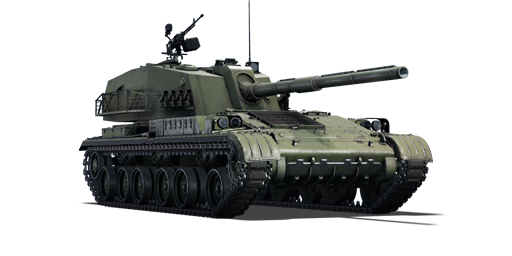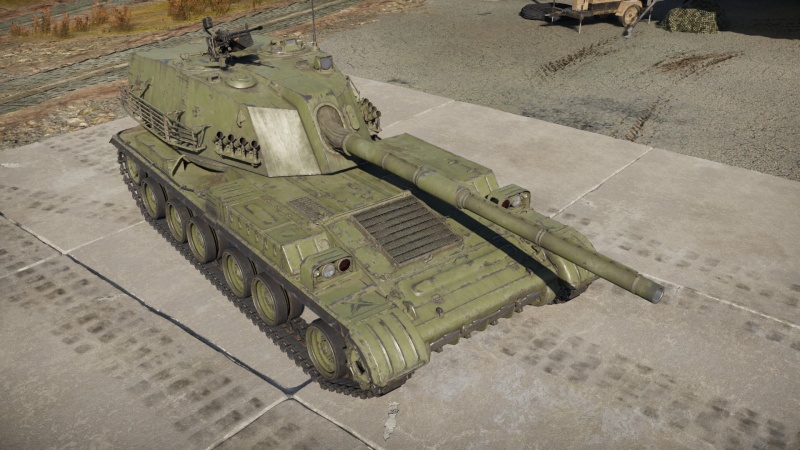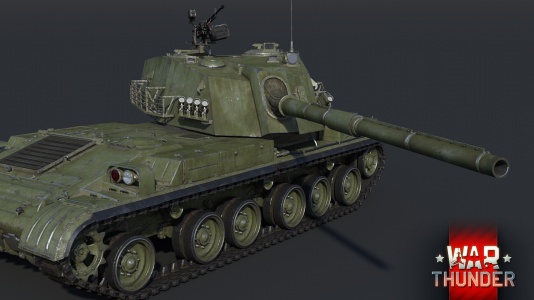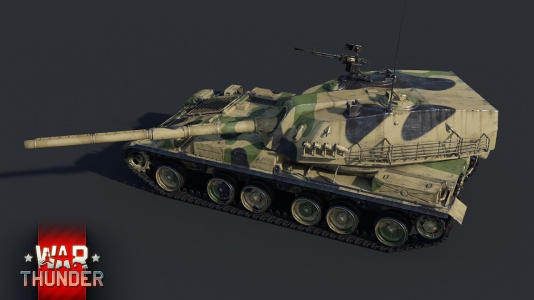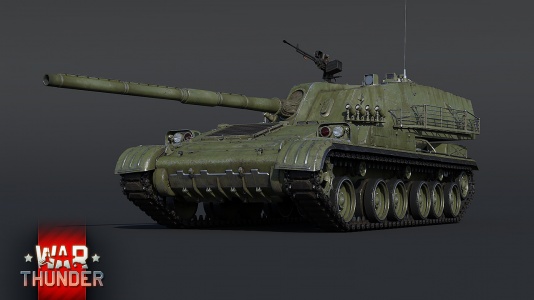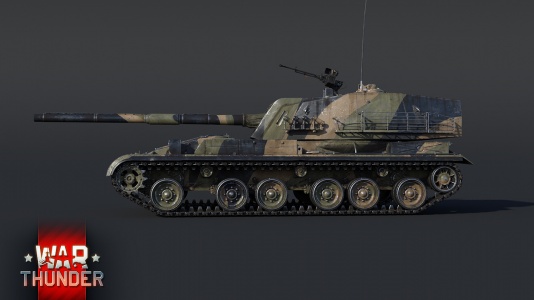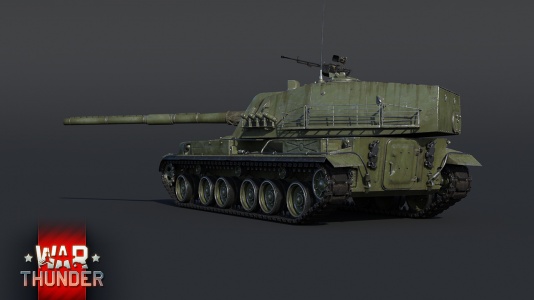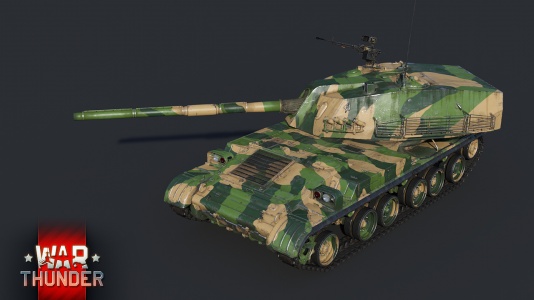PTZ89
Contents
Description
The HuoPao Tanke ZiXing 89 (Chinese: PTZ89式坦克歼击车), known among Chinese military enthusiasts as the "Eastern Ferdinand" (东方费迪南) due to its shape and heavy firepower, was likely the last gun-based tank destroyer ever produced, part of the PLAGF modernization program in the late 1980s aimed at countering the menacing Soviet forces. The 120 mm smoothbore cannon can be traced back to the Project 122, which originated from the PLAGF's requirement for a high-calibre gun capable of neutralizing Soviet tanks in the Far East. Although previous attempts faced technological challenges and the introduction of NATO-calibre guns, Chinese engineers eventually developed a new 120 mm cannon as part of the WZ123 (ZTZ99) program. This was tested against a reverse-engineered 2A46M gun from an Object 172M-1 E-4 (T-72U or Type 64 六四型), with the latter being selected. In order to preserve their efforts and enhance firepower against waves of Soviet armoured units, the 120 mm gun was incorporated into a new mobile gun platform on the WZ321 chassis for the PLAGF. This platform, known as the PTZ89, featured an autoloader to maximize firepower during potential defensive operations. Although introduced at a time when it was already considered obsolete, the PTZ89 remained in service until 2015, its retirement officially marking the end of gun-based tank destroyers.
Introduced in Update "New Power", the PTZ89 is a purpose-built tank destroyer armed with a formidable 120 mm smoothbore gun, somewhat similar in layout and concept to the infamous Soviet Object 120. It is remarkable for having entered service in 1989; by then, the era of the main battle tank was well underway and gun-armed tank destroyers were out of fashion. This conundrum exists in War Thunder as well, where the PTZ89 faces agile and well-armed tanks like the Leopard A1A1 while not being speedy or well-protected itself. Still, if the PTZ89 does one thing well, it's firepower. The marvellous cannon easily penetrates almost anything it meets and the assisted loader allows several targets to be destroyed in quick succession. This vehicle is all about its gun and a skilled gunner can make good use of it for sniping and ambushes.
General info
Survivability and armour
The PTZ89 is built on the chassis of the Type 83 self-propelled howitzer and its overall protection is disappointing. The hull has enough armour to shrug off heavy machine guns from the front but the sides are only 15 mm thick. The large and bulbous turret is even more vulnerable, the sloped turret face only being 22 mm thick. Never trust the armour of the PTZ89, vehicles armed with autocannons will easily shred it and it can be gunned down by the ubiquitous M2 Browning heavy machine gun from the sides. Any aircraft equipped with cannons or heavy machine guns can destroy it from above.
The thin armour ironically makes subcalibre rounds produce less spalling upon penetrating the tank, but the internal layout can still lead to fatal results. The three crew members are lined up on the left side of the tank (right side from an attacker's perspective) and well-aimed shots might knock all of them out, putting the vehicle out of commission. That said, the turret seating is rather high and there is a chance that a shot knocking out the driver might pass underneath the turret crew. The turret bustle also houses many rounds of ammunition without blowout racks and penetrating shots to the turret front or rear can set them off.
The PTZ89 is susceptible to overpressure damage. Sizeable HE shells that hit the crew compartment will often knock out all of the crew members in one hit. Nearby artillery impacts, rocket detonations, or bomb explosions are dangerous for similar reasons. Other chemical ammunition like HESH and HEATFS might cause the effect to a lesser extent but not at a reliable frequency.
| Armour | Front (Slope angle) | Sides | Rear | Roof |
|---|---|---|---|---|
| Hull | 10 + 10 mm (71°) Upper glacis 35 mm (1-66°) Transmission housing 15 mm (20°) Mine plow attachment plate |
15 mm | 10 (9°) mm | 10 mm |
| Turret | 22 mm (30°) Turret front 30 mm (32°) Gun mask 40 mm (9-36°) Gun mantlet |
18 mm (14°) | 18 mm | 15 mm (79-89°) |
| Cupola | 15 mm | 15 mm | 15 mm | 15 mm |
Notes:
- Suspension wheels are 20 mm of structural steel, tracks are 15 mm thick,
- Engine radiator grilles are 5 mm of RHA.
- Internal firewall around the engine/transmission compartment, 5 mm RHA thick.
- Slat armour on turret sides, 10 mm of structural steel.
- Skirts and storage boxes above tracks are 4 mm of structural steel.
Mobility
| Game Mode | Max Speed (km/h) | Weight (tons) | Engine power (horsepower) | Power-to-weight ratio (hp/ton) | |||
|---|---|---|---|---|---|---|---|
| Forward | Reverse | Stock | Upgraded | Stock | Upgraded | ||
| Arcade | Expression error: Unexpected * operator. | 739 | Expression error: Unexpected round operator. | __.__ | |||
| Realistic | 460 | Expression error: Unexpected round operator. | __.__ | ||||
The PTZ89 has a better power-to-weight ratio than the contemporary ZTZ59D1 and M60A3 TTS, but not by much, and it is still unlikely to win any races versus Leopards or OF-40s. The 8 km/h reverse speed is poor but pretty typical for a Chinese vehicle. It is more concerning than usual on the PTZ89 since the chassis is very long and reversing into cover is not easy. However, since the turret is located at the rear of the vehicle, it often makes sense to peek out of cover using the reverse gear and quickly re-enter cover by driving forward.
Modifications and economy
Armaments
Main armament
The PTZ89 uses a domestic 120 mm smoothbore cannon. The turret is equipped with an assisted loader in the bustle that can hold up to 10 rounds at once. When the assisted loader still has ammunition, the gun only takes 5 seconds to reload, which is highly impressive for its rank. Refilling the assisted loader is done one round at a time and takes a while, so it's best to take a break from heated combat once the supplies start to run low. The turret rotation speed is 18 degrees per second in RB with an ace crew, which is below average but not agonizing like the ZTZ59D1. Gun depression and elevation levels are rather poor, so be careful on hilly terrain. 5 degrees of gun depression is better than the ZTZ59D1 but still far worse than the M60A3 TTS.
| 120 mm PTZ89 | Turret rotation speed (°/s) | Reloading rate (seconds) | ||||||||
|---|---|---|---|---|---|---|---|---|---|---|
| Mode | Capacity | Vertical | Horizontal | Stabilizer | Stock | Upgraded | Full | Expert | Aced | Autoloader |
| Arcade | 30 | -5°/+18° | ±180° | Two-plane | 15.8 | 21.9 | 26.6 | 29.4 | 31.3 | 5.00 |
| Realistic | 10.7 | 12.6 | 15.3 | 16.9 | 18.0 | |||||
Ammunition
| Penetration statistics | |||||||
|---|---|---|---|---|---|---|---|
| Ammunition | Type of warhead |
Penetration @ 0° Angle of Attack (mm) | |||||
| 10 m | 100 m | 500 m | 1,000 m | 1,500 m | 2,000 m | ||
| DYW1 | APFSDS | 443 | 442 | 436 | 429 | 422 | 416 |
| DYS120 | HE | 30 | 30 | 30 | 30 | 30 | 30 |
| Shell details | ||||||||||||
|---|---|---|---|---|---|---|---|---|---|---|---|---|
| Ammunition | Type of warhead |
Velocity (m/s) |
Projectile mass (kg) |
Fuse delay (m) |
Fuse sensitivity (mm) |
Explosive mass (TNT equivalent) (kg) |
Ricochet | |||||
| 0% | 50% | 100% | ||||||||||
| DYW1 | APFSDS | 1,740 | 4.45 | - | - | - | 78° | 80° | 81° | |||
| DYS120 | HE | 900 | 19.5 | 0 | 0.1 | 2.49 | 79° | 80° | 81° | |||
The PTZ89 has two choices of ammunition. The stock DYW1 APFSDS should definitely be the round of choice: it has outstanding muzzle velocity and penetration, knocking all contemporary APFSDS rounds out of the park. The flat penetration of up to 443 mm is enough to penetrate the turret of the M1 Abrams and the angled penetration of up to 256 mm at 60 degrees is better than the top 3BM42 "Mango" APFSDS used by most top-tier Soviet tanks. It also has a good weight and produces more spalling than typical 105 mm APFSDS rounds, so one-shot kills are quite common when shooting at the center mass of enemy tanks. The only Western tanks the PTZ89 can meet that have some resistance to DYW1 are the British Chieftain Mk 10 and Challenger Mk.2/Mk.3. The Chieftain has a very well armoured left turret cheek (right side from an attacker's perspective). The upper portion of the Challengers' turret cheeks and the sections immediately to the left and right of their gun barrels are impenetrable. These trolly turrets are only a complication if they are entirely hull-down since DYW1 will slice through their hull armour with ease. The various T-64s and T-72s have tough turrets as well, but they are typically not encountered often and a successful hull penetration will usually destroy them in one hit.
The DYS120 HE shell is not very powerful and has limited utility. It might be able to knock out lightly armoured targets with pressure damage, but it is often more convenient to just mop up these targets with the APFSDS considering the fast reload and high velocity. It has an underwhelming TNT equivalent for its calibre and will not do much against medium tanks.
Ammo racks
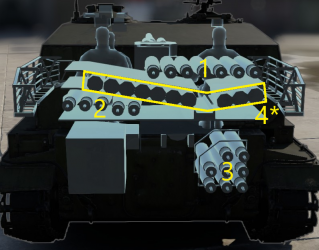
| Full ammo |
1st rack empty |
2nd rack empty |
3rd rack empty |
4th rack empty |
Visual discrepancy |
|---|---|---|---|---|---|
| 30 | 24 (+6) | 19 (+11) | 11 (+19) | 1 (+29) | No |
Machine guns
| 12.7 mm QJC88A | ||||
|---|---|---|---|---|
| Mount | Capacity (Belt) | Fire rate | Vertical | Horizontal |
| Pintle | 600 (150) | 600 | -6°/+85° | ±180° |
Usage in battles
The selling point of the PTZ89 is its ability to sling very powerful APFSDS downrange at a very rapid pace. If a target is in the gunner's sight, cleaning them up is easy. The challenge is getting into a situation to use that firepower; the PTZ89 is easy to spot, not particularly fast, and horribly protected, so any enemy that sees the PTZ89 can easily send it back to the hangar. IFVs and SPAAs are perhaps the biggest threat to the PTZ89 since, unlike MBTs, they can afford to start sending dozens of rounds downrange at first sight instead of needing to carefully lay their gun on target, reducing the window of time available for a preemptive shot. The M3 Bradley's relatively small 25 mm autocannon, which can hardly scratch the paint off the ZTZ59D1's armour, will turn the PTZ89 into a colander.
Avoid charging directly into combat. Stick close to cover and always keep an eye out for enemy vehicles. Since the PTZ89 lacks thermal sights, all spotting must be done using the naked eye, looking for movement and muzzle flashes. If you can stay concealed and identify targets before they are aware of you, it should be safe to peek out of cover and knock out a tank or two. Change positions after every few kills to maintain the element of surprise.
The PTZ89 is the first Chinese vehicle with access to a dozer blade for entrenchment. It can be used to augment existing cover or create some where none exists, which is important for the fragile PTZ89, but remember that its substandard gun depression and lack of turret armour prevent it from simply lounging in a hull-down position and disregarding incoming fire. A well-dug position will make it slightly more difficult for enemies to spot and target the PTZ89, which offers a larger window to preemptively knock them out. When under attack, hiding the hull will protect the driver, transmission, and engine to allow for a safer retreat to tall cover.
Helicopters and planes are a massive threat. Even propeller fighters armed with heavy machine guns are capable of destroying the PTZ89, to say nothing of jets armed with rockets, bombs, or air-to-ground missiles. If enemy aircraft are around, stay close to buildings or trees and use the smoke grenades as a last resort. The pintle-mounted QJC88A heavy machine gun might be helpful against lightly armoured helicopters in a pinch, especially since it has a decent 150 round belt capacity in contrast to the very stingy DShK seen on many previous Chinese vehicles.
The PTZ89 is very much a high risk and high reward vehicle. It relies heavily on the user's situational awareness and gunnery skills. A stroke of bad luck or a slight mistake can result in getting unceremoniously shredded by autocannons or getting ammo-racked from across the map, but with some good positioning and a careful trigger finger, the PTZ89 can wipe out targets with ruthless efficiency.
Enemies worth noting:
- SPAAs like Gepard, M247, ZSU-37-2, etc.: these vehicles are all equipped with rapid-firing autocannons capable of tearing through the PTZ89's thin armour easily. The fast rate of fire allows them to wipe out your crew quickly. As they are built for anti-aircraft purposes, they usually have fast turret traverse speed, meaning they can quickly target the PTZ89 in a sudden encounter while the PTZ might struggle due to its slower aiming. Thus the best option is to keep your distance, conceal yourself, and look out for their shots. Unaware SPAAs will usually be busy spraying shells towards the sky, exposing their positions to you. Their tall and rotating radar antennas are also quite revealing.
Pros and cons
Pros:
- Excellent APFSDS round with very high velocity, great penetration and flat trajectory; comes with the vehicle as stock ammo
- Five-second reload thanks to the assisted loader
- Two-plane stabilizer giving it advantage in shoot-n-scoot tactic or sudden close encounters
- Roof-mounted 12.7 mm heavy machine gun can effectively damage low flying helicopters, lightly armoured vehicles (eg. SPz BMP-1) or even aircraft
- Two salvos of smoke grenades can provide protective cover (to some extent) twice for the player
- Nice top speed
- Access to a dozer blade
Cons:
- Very poor all-round armour making it extremely vulnerable to rockets, bombs or even .50 calibre rounds, let alone APFSDS and missiles
- Mediocre mobility overall
- Slow reverse speed of only 7-8 km/h can put the player in a fatal situation
- Below average turret rotation speed
- Bad gun depression of only -5 degrees, limiting its terrain adaptation for different maps
- Humongous tank, increasing the chance of being spotted and hit
- Vulnerable to pressure damage
History
During the 1970s, new tanks like the T-64 and T-72 were entering service in the Soviet Union, and with tensions between China and the Soviet Union still being tense, China needed a gun capable of defeating these tanks. The problem was, their primary tank was still the Type 59, a Chinese version of the T-54 tank, still armed with a 100 mm rifled gun. During this period, China tried to turn to Rheinmetall for their new 120 mm L/44 smoothbore gun, but this was rejected. The Chinese decided to develop their own gun, using technology and knowledge from the T-62 they had captured at Zhenbao Island.
In 1979, three versions of the gun were completed, with an estimated 1,000 APFSDS rounds fired. In February of that year, gun design 82-2 penetrated 204 mm on a 68 degree armour at a speed of 1,646 m/s. In 1981, the basic design was completed, with gun design 82-14 being chosen for the new 120 mm smoothbore gun. This could fire an APFSDS projectile at 1,700 m/s, penetrating 204 mm of armour at a 68 degree angle.
Following this, the gun was put in a turret on the Type 321 utility tracked chassis that would be used on other vehicles such as the PHZ-89 or PGZ-09. The vehicle would be demonstrated in 1985 in Nankou, Beijing, with more tests being conducted until late 1988, when it finally began initial production. It first entered service in 1989, and by the time it was retired, around 100 had been produced. Having served its purpose and with the rise of new Chinese MBTs such as the ZTZ99 (with more capable guns), it retired in November 2015, when the 39th Army Group held an official retirement ceremony for the vehicle.
Devblog
In the late 1970's, Chinese engineers began developing a new combat vehicle which would be capable of defeating some of the most commonly used second generation main battle tanks, such as the Soviet T-62 and T-72, among others. The basic design would be that of a turreted, lightly armoured yet mobile tank destroyer.
Development work was slow and dragged itself through the first half of the 1980's for various reasons, including lack of funding. However, by the late 1980's, the project picked up pace again and several prototypes and pre-production vehicles were built for testing and evaluation.
Following a successful testing phase, the PTZ-89, as it became known, was approved for production in early 1990, with small-scale production commencing and the first vehicles reaching units in 1991. With the end of the Cold War, however, the need for a vehicle such as the PTZ-89 diminished, leading to an early production stop in the late 1990s.
Media
- Skins
- Images
- PTZ-89 Devblog Images
- Videos
See also
Links to the articles on the War Thunder Wiki that you think will be useful for the reader, for example:
- reference to the series of the vehicles;
- links to approximate analogues of other nations and research trees.
External links
| Norinco (China North Industries Corporation) | |
|---|---|
| Light AFV/IFV | |
| WZ501 | ZBD86¹ |
| WZ131 | ▂Type 62 · Type 62 |
| WZ211 | Type 63 · ZTS63 |
| WZ502 | ZBD04A |
| MBT | |
| WZ120 | Type 59¹ · ZTZ59A · ZTZ59D1 |
| WZ121 | Type 69 |
| WZ122 | ZTZ88B · ZTZ88A · ZTZ96 · ZTZ96A · ZTZ96A (P) |
| WZ123 | ZTZ99-II · ZTZ99-III |
| WZ1001 | WZ1001(E) LCT · ZTZ99A |
| Tank Destroyers | AFT09 · PTL02 · PTZ89 · ZLT11 |
| SPH | PLZ83 |
| SPAA | ZSD63/PG87² · PGZ09 · PGZ04A |
| Export | |
| WZ121 | Type 69-IIa · T-69 II G |
| MBT2000 | MBT-2000 · Al-Khalid-I |
| MBT3000 | VT4A1 |
| Other | WMA301 · WZ305 |
| ¹ License production / Reverse engineered · ² Field modifications | |
| China tank destroyers | |
|---|---|
| PLA | |
| Gun vehicles | PLZ83 · PLZ83-130 · PLZ05 · PTZ89 |
| Missile vehicles | AFT09 |
| ROC | |
| Missile vehicles | CM25 |
| USA | |
| Gun vehicles | ␗M8 HMC · LVT(A)(4) (ZiS-2) · ␗M10 GMC · ␗M36 GMC |
| Missile vehicles | ␗M113A1 (TOW) |
| USSR | |
| Gun vehicles | ␗SU-76M · ␗ISU-152 · ␗ISU-122 · ␗SU-100 |


